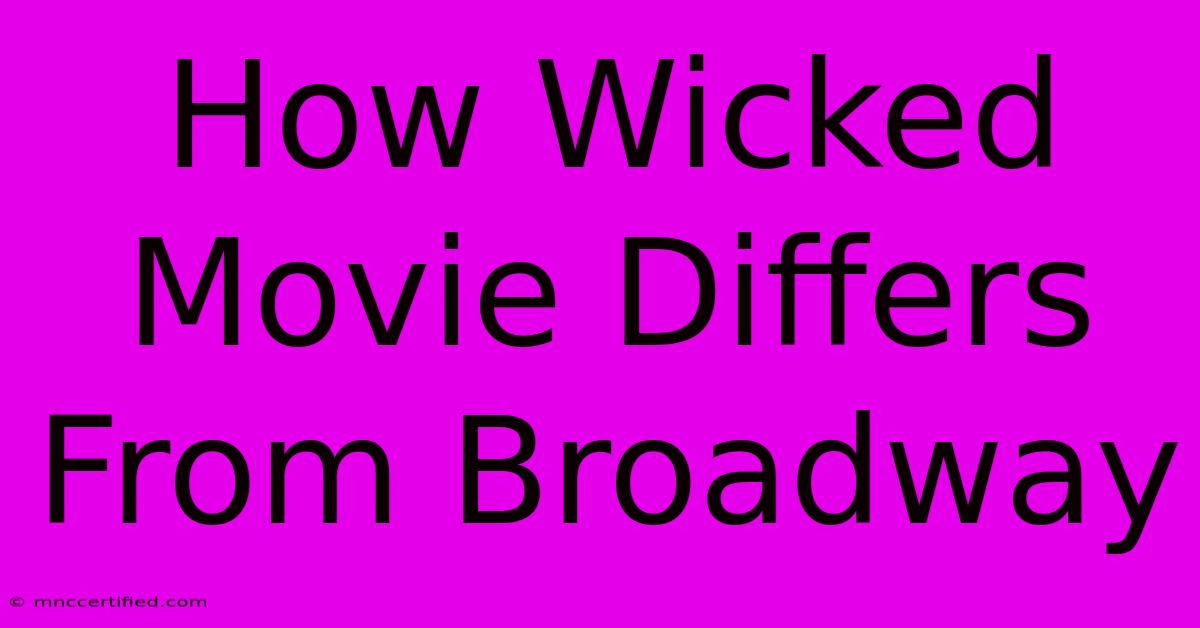How Wicked Movie Differs From Broadway

Table of Contents
How the "Wicked" Movie Differs From the Broadway Phenomenon
The highly anticipated film adaptation of the Broadway juggernaut, Wicked, finally graced the silver screen, leaving audiences both captivated and comparing it to the beloved stage production. While the movie stays true to the core narrative of Elphaba and Galinda's friendship, several key differences exist, impacting character development, musical arrangements, and overall thematic resonance. This article delves into the significant disparities between the stage and screen versions of Wicked, highlighting what makes each unique.
Story Adaptations and Narrative Choices: A Deeper Dive
One of the most noticeable differences lies in the pacing and narrative choices. The Broadway show, spanning nearly three hours, allows for a more leisurely exploration of the characters' backstories and complex relationships. The movie, however, needs to condense this extensive narrative into a more concise runtime. This necessitates streamlining certain plot points and omitting several songs, impacting the depth of character development and emotional resonance, particularly for those deeply familiar with the stage musical.
Character Development: Elphaba and Galinda's Transformation
While the core relationship between Elphaba and Galinda remains the heart of the story in both versions, their individual character arcs undergo subtle yet impactful shifts. The movie emphasizes certain aspects of their personalities, potentially at the expense of others that are more fully developed in the stage show. For example, Elphaba's fierce independence and unwavering belief in her ideals are showcased prominently, but some nuances in her vulnerabilities might be less pronounced on screen. Similarly, Galinda's transformation from a superficial socialite to a more empathetic and grounded individual might feel less gradual in the film's quicker pacing.
The Omission of Key Scenes and Songs: What Was Lost in Translation?
The movie's shorter runtime necessitated the removal of several songs and scenes integral to the stage production. The absence of beloved numbers like "No Good Deed" or the extended version of "Popular" affects the overall flow and emotional impact of the narrative. These omissions, while necessary for pacing, might leave some long-time fans feeling a sense of incompleteness. However, the film also introduces new musical sequences and expands on existing scenes, offering a fresh perspective on familiar moments.
Visual Spectacle vs. The Intimacy of the Stage: A Comparison of Production Values
The movie's greatest strength lies in its breathtaking visuals and cinematic scale. The elaborate costumes, sets, and special effects bring the land of Oz to life in a way that surpasses the stage production's capabilities. The sheer visual grandeur enhances the overall spectacle, adding a layer of immersive magic for the viewers. Conversely, the Broadway show offers an intimacy and immediacy that the film struggles to replicate. The connection between the actors and the audience on stage creates a unique energy that the cinematic experience, despite its impressive scale, can't fully match.
Musical Arrangements and Orchestration: A New Sonic Landscape
While the core musical numbers remain intact, the movie's musical arrangements differ noticeably from the stage production. The orchestral score is amplified and enhanced, providing a richer and more cinematic listening experience. However, certain nuances and subtle instrumental variations found in the original Broadway score might be lost or altered in the film's adaptation. This change reflects a deliberate shift in sonic landscape, aiming for a more grandiose and epic feel.
The Verdict: Two Distinct but Equally Enchanting Experiences
Ultimately, both the Broadway production and the movie adaptation of Wicked offer compelling and unique experiences. The stage show allows for a deeper exploration of the characters and their intricate relationships, while the film delivers a visually stunning and spectacular adaptation, enhancing certain aspects of the story with its cinematic prowess. Choosing a favorite boils down to personal preference and what one values most in a theatrical experience. Both versions deserve appreciation for their contributions to the enduring legacy of Wicked. The movie offers a fresh perspective for newcomers, while longtime fans can appreciate the fresh take on a beloved classic.

Thank you for visiting our website wich cover about How Wicked Movie Differs From Broadway. We hope the information provided has been useful to you. Feel free to contact us if you have any questions or need further assistance. See you next time and dont miss to bookmark.
Featured Posts
-
Loeffler Trumps Ag Secretary Pick
Nov 23, 2024
-
California Mortgage Broker Bond
Nov 23, 2024
-
Boson Protocol Price Prediction
Nov 23, 2024
-
Alexas Morgan And Savannah Bond
Nov 23, 2024
-
Bonding Activities For Siblings
Nov 23, 2024